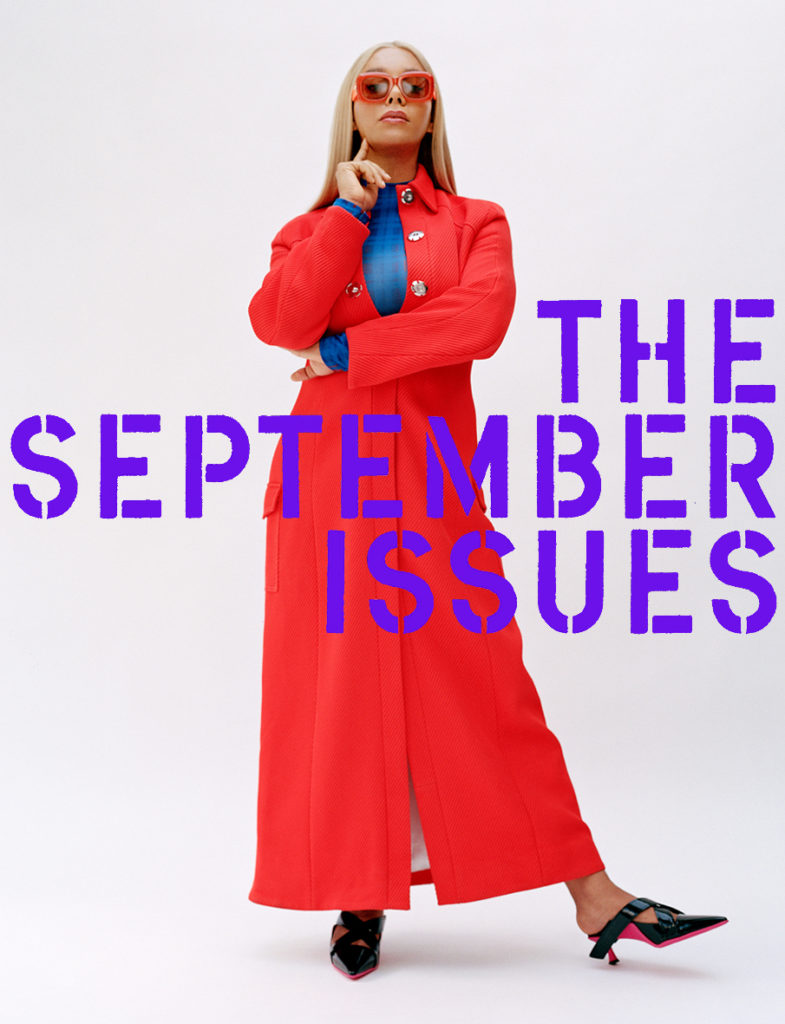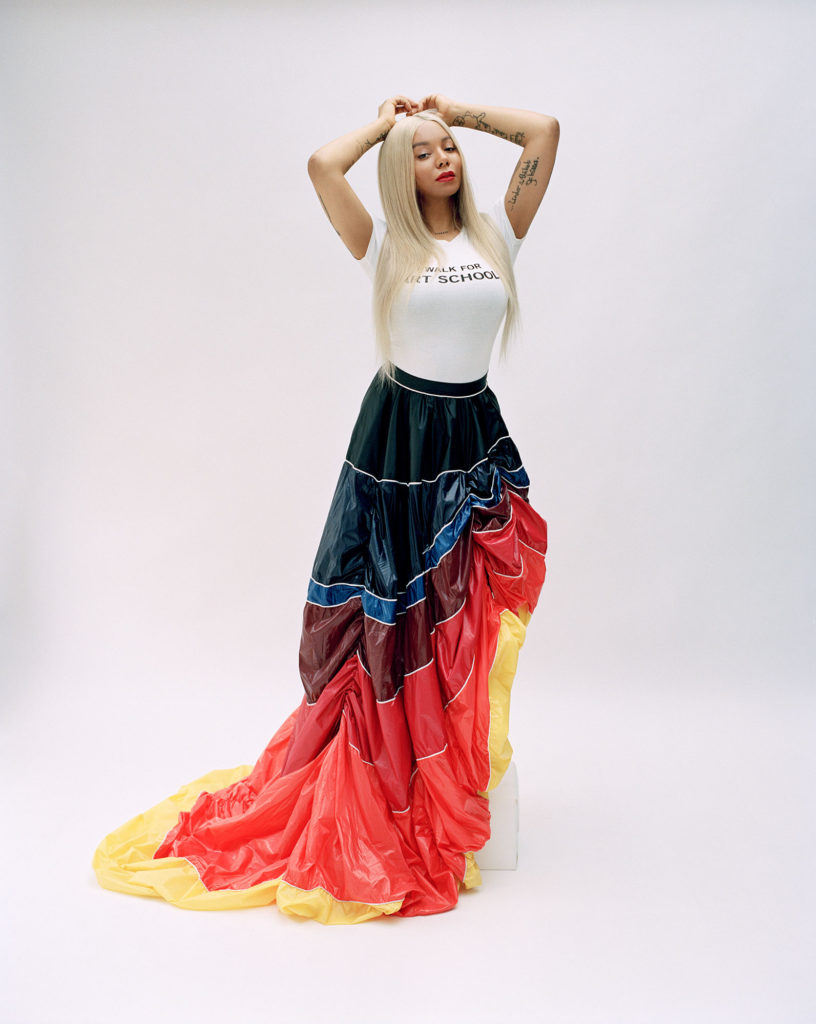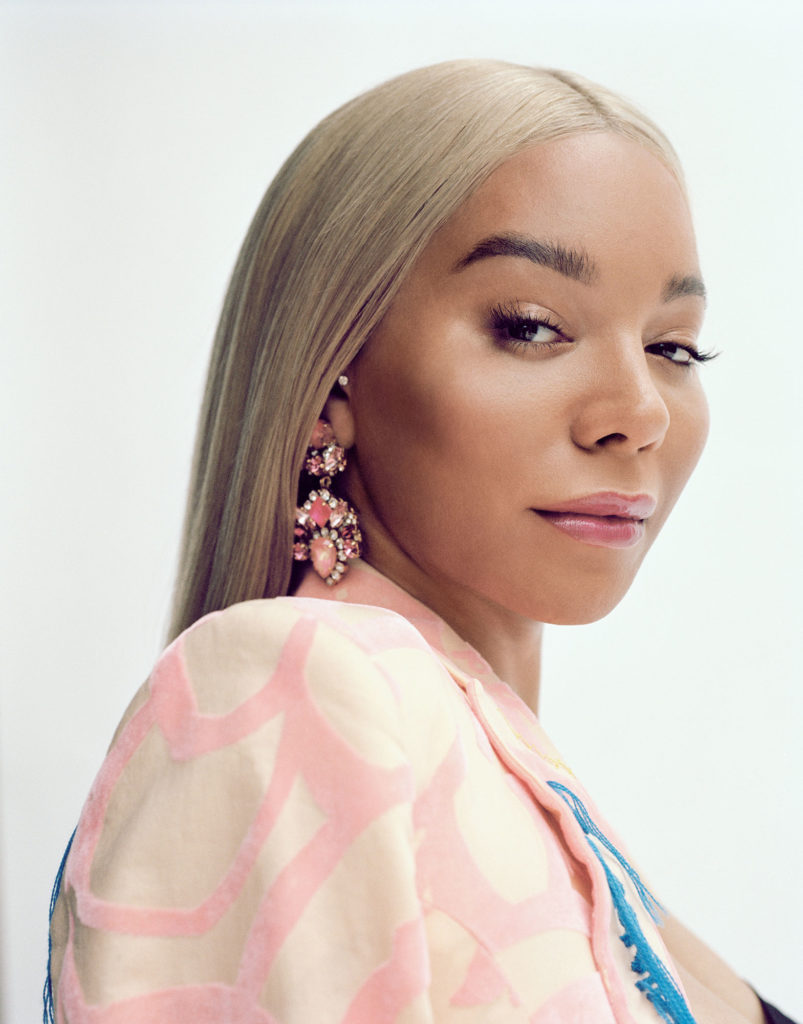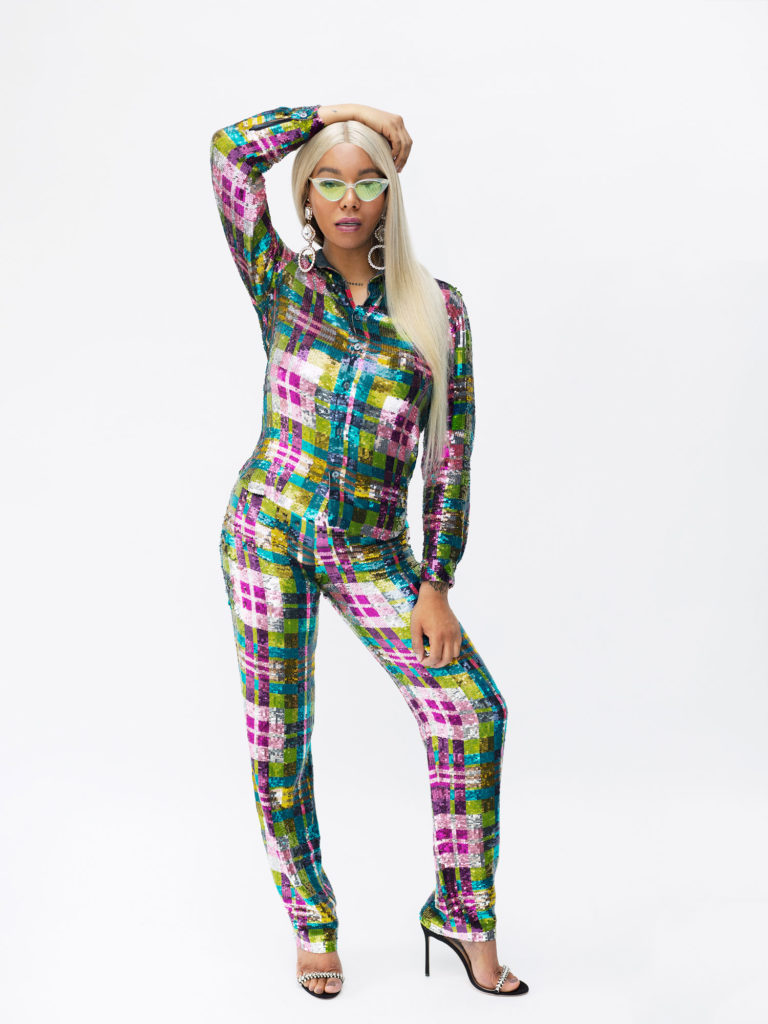
top RICHARD MALONE
shoes KENZO
sunglasses LINDA FARROW
Josephine Jones interviews Munroe Bergdorf, a transgender model and activist known for her honest insight into matters of inclusion, feminism, and the transgender community. In honor of the 50th anniversary of the Stonewall Riots and London Pride, Munroe reminds us that Pride is a protest, not a parade.
Being an only child sucks! However, today I am blessed to be speaking to someone I’m proud to call my #BigSisMunroe, Munroe Bergdorf. Picture our first meeting: Munroe was standing in front of me in a queue during a runway rehearsal for a super chic non-binary fashion label, ART SCHOOL. And yes, her walk was fierce! But Munroe is more than the beauty and confidence she exudes. She uses her platform to advocate for a fairer world and to empower individuals to fight for positive change. Munroe is regularly featured in international and national news outlets and provides a voice for so many of us in the LGBTQ+ community. She’s a beacon of hope, one might say.
This year is the pride jubilee, the 50th anniversary of the Stonewall Riots that started it all. Say their names with me: MARSHA P. JOHNSON, SYLVIA RIVERA, MISS MAJOR. It was trans women of color who led the rebellion against police brutality and started the fight for queer liberation—a fight that Munroe is continuing with her tireless activism and advocacy for marginalized groups.
As a trans woman I know all too well that the fight for true equality is not yet won, and I admire Munroe’s resilience in the face of prejudice, and her unflinching honesty about the reality of the work ahead of us.
Kindness and realness pour out of Munroe in spades like a woke waterfall… and we’re all just happy to be getting soaked.
JJ: Can you speak to the importance of authentic storytelling? How does that impact marginalized voices and further culture?
M: Storytelling from marginalized perspectives is especially important because so much of our history has been erased. Whether it be colonialism or whether it be bigoted homophobic and transphobic law-making and legislation, I think with oppression comes oppression of stories. So, the more of us are sharing our experiences and sharing our past experiences with each other the more accurately we can tell stories of the reality of what it means to be a marginalized person.
JJ: I agree. Satsumas are not particularly glamorous and don’t remind of the LGBT community at all. The pride flag plastered all over supermarket satsumas has me thinking… what role can brands play in visibility and representation?
M: I think brands need to be willing to put the power in the hands of the LGBT community. We’re seeing a lot of brands that want to speak about the experience of being LGBT, when a lot of the issues that people are marching for aren’t being spoken about. Brands are just glossing over it with a rainbow flag and a ‘love is love’ slogan. We need to focus on the political and progressive aspects of pride. The only way that brands are going to be able to work in favor of the LGBT community rather than just benefitting from us – is by employing us.
“The only way that brands are going to be able to work in favor of the LGBT community rather than just benefitting from us, is by employing us.”
JJ: Preach!
M: It just speaks testament to diversity needing to be present throughout your company not just in your product.
JJ: You can’t put the pride flag on satsumas. It’s not suddenly satsuma pride.
M: For sure, some of the stuff we’ve seen this pride month is mind-boggling. Pride flags on sandwiches. Pride flags on mouthwash. You know?
JJ: I do, girl.
M: It’s almost like people don’t understand the issues we’re still facing. They’re masked under the umbrella of free speech-
JJ: [ironic gasp]
M: It’s almost an option to be transphobic in the UK. People think that that’s just your opinion. Compared to being a homophobe or a racist, that’s wrong! It’s almost like transphobic people are being allowed so much more slack on the leash… I always say abusing your freedom of speech is different to speaking freely.
JJ: You said something the other day which really stuck with me:
‘REPEAT AFTER ME: TRANS WOMEN OF COLOR STARTED PRIDE’
M: It just comes down to the respect of the most marginalized members of our community and how we see them. Our stories aren’t shared as much as cis white gay men who have been at the top of the hierarchy within our community that has manifested. Usually, it’s the most marginalized people who are putting in the most effort. And cis white gay men have become more accepted within society and are not faced with such an immediacy of threat. Now we’re seeing with black trans women, we have increased representation; but not the power or the safety.
JJ: We all should feel in the legacy of trans women of color, Marsha P Johnson, Silvia Rivera for whom pride was certainly a protest.
M: Exactly, and as our stories are being told, people are realizing what we’re facing. We’ve had a really rocky pride month.
JJ: There’s been five transgender women murdered in pride month alone (!)
M: It’s just a never-ending onslaught… Largely stemmed from governments refusing to speak openly about condemning transphobia. I feel that the governments are fanning the flames in their inaction.
JJ: We all have our parts to play. How can we be more responsible as consumers in awareness of capitalism’s influence on pride?
M: Well it’s debatable if there’s-
M & JJ: -any ethical consumption under capitalism! [sarcastic giggles]
M: But I do think that we can try, if you’re spending money with big corporations, check where they’re donating their money to.
JJ: Do you think pride is being co-opted by big business?
M: Pride has become much more of a parade than a protest. It’s just keeping that in mind, making sure we’re doing more during pride month than just focusing on the parade.

skirt FYODOR GOLAN
shoes SOPHIA WEBSTER
“Pride has become much more of a parade than a protest.”
JJ: It’s the icing on the cake, not the cake.
M: Well things change, and UK black pride has been a reaction to pride becoming so corporate. I know they’re working on its diversity, but it’s a given that lots of POC LGBT people feel under represented either in imagery or media representation. The fact that UK black pride exists is a sign that we’re moving towards a more inclusive pride and getting back to the roots of the protest.
JJ: Exactly. UK Black pride is essential to undo the whitewashing. But how can we get more diverse individuals in decision making roles?
M: We need to look at who’s doing the hiring – if its only white people doing the hiring chances are with the UK being 86% white people, the likelihood is that a white person is going to get that job. Unless they’re thinking beyond the people who are coming in. It’s about going out and looking for the most diverse team. The fact that we are minorities means that we are harder to find. And we’re also afforded less opportunities for us to shine for you to find us. Companies just need to step out of the procedures they’ve been relying on.
JJ: They say the definition of madness is doing the same thing over and over again and expecting different results.
M: That’s it! With every single part of society, we need to look at how it’s been built. Society has been built for white people. Society has been built for heterosexual people and cisgender people. Transgender people are literally re-defining what it means to be a citizen!
“Transgender people are literally re-defining what it means to be a citizen!”
JJ: Pushing up against that curve every single day and girl—it’s exhausting. But fabulous!
M: Well, we’re making it fabulous [laughs]. Well it’s one rule for cisgender people and another rule for transgender people. We’ve established men shouldn’t be making rules for women’s bodies, but we’ve got cis people making decisions for trans people’s bodies, we’ve got straight people making rules for gay people’s bodies. We need queer people in parliament. We need transgender people in parliament!
JJ: Yes!
M: We’ve got no representation and it’s almost like our autonomy is being taken away by proxy. We need the same attention with regard to legislation being made for us, as for the men who are making decisions for women’s bodies and the outrage that comes with that.
JJ: For sure. Social media has been an important influence in the proliferation of social justice movements, but do you think the positive aspects outweigh the negative?
M: Like anything, lack of regulation is going to lead to issues. We need to crack down on what constitutes homophobia, transphobia, and gender-based violence—based on what that community says themselves. Black people on the internet are being abused at such a high rate but it’s being co-signed because the legislation is being written by white people. And a white person can never understand, first-hand, what it feels like A) to be on the end of racial violence and B) what it means to be going through this on the internet.
“We need to crack down on what constitutes homophobia, transphobia, and gender-based violence—based on what that community says themselves.”
JJ: You’re so inspiring to me.
M: Thank you, I’m trying. I feel about 56!
JJ: Well in fashion, darling, we’re all about 72!
M & JJ: [giggles]
JJ: What do you think about modern day activist culture? Is social media enough?
M: I don’t think as a blanket statement social media is ever enough. At some point it does need to come offline. But with regards to one person I think people can only take on what they can manage. I don’t think that everyone can take it off social media, but some people have to. Plus, we’re all good at something. It’s about applying your skill set. Use it! Doesn’t have to be boring. It doesn’t have to be traditional.
JJ: How did you find your voice?
M: Look at adversity as an opportunity not as a setback, it helps me refine my message. I mean you see that all the time in the trans community. We’re in the process of the trans revolution—we’re standing on the shoulders of giants. Marsha P Johnson, Miss Major, Silvia Rivera—girls who put in a lot of the legwork. It’s the beginning of changing the world for us and we keep on pushing up against the doors that are being shut on us. One of these days they’re going to stay open.
“We’re in the process of the trans revolution—we’re standing on the shoulders of giants. Marsha P Johnson, Miss Major, Silvia Rivera—girls who put in a lot of the legwork. It’s the beginning of changing the world for us and we keep on pushing up against the doors that are being shut on us. One of these days they’re going to stay open.”

earrings VICKI SARGE
JJ: SO happy to hear you say that. Next time we’re up against one of these doors I’ll bring my jack-hammer.
M: Yes! You know sis! [laughter] I’ll bring my Dr. Martens!
JJ: I’ll leave my Prada shoes at home…
M: Everyone is doing the best they can—being trans is not easy. Well, being trans is easy, it’s other people that make it hard.
“…being trans is easy, it’s other people that make it hard.”
JJ: Omg! I saw you post that ‘The best thing about being trans is BEING TRANS and the worst thing about being trans is OTHER PEOPLE. I need to get that tattooed!
M: [laughs]
JJ: So, Munroe, what is the best way to have difficult, but necessary, conversations surrounding systemic oppression? And who needs to be part of these conversations?
M: Everyone needs to be part of these conversations!
JJ: Hell yes!
M: Privileged people need to be pushing themselves a bit further to be understanding us at a greater capacity as it’s difficult for us just to exist.
JJ: What does it entail for those outside the queer community to be effective allies?
M: Using whatever you’re good at. Being inconvenienced by either giving your time or money needs to be secondary to how dire the situations we’re facing are.
JJ: The one thing that really strikes me about you Munroe is that you haven’t hardened. You’re still sensitive and emotive.
M: I’m trying, it’s difficult when so many people have an opinion on you but they’re not working on themselves in any capacity.
JJ: Bless. As an activist, you are constantly confronted by individuals who are driven by hate and ignorance. What is your advice for overall mental health?
M: You don’t need to give everyone an answer. People aren’t entitled to a debate. If it’s your identity or your rights, you don’t need to debate it. Your priority has to be your mental health because if your mental health isn’t on point then you can’t be there for your community.
JJ: Well said, but how do you reconcile that in your self care regime?
M: I like to say: sex, scent and sorbet. (I mean ice-cream, but I say sorbet because it sounds fancy and I wanted 3 S’s!)
JJ: [laughter] That’s amazing!!
M: I say sex because It’s really important to connect with your body. Especially for a lot of trans people, masturbation can be a difficult thing to negotiate.
JJ: You can disassociate, for sure.
M: Exactly, especially if there’s dysphoria within how you see your body. Making sure you keep a connection with your mind-body link. Especially as a trans woman—female pleasure is stigmatized anyway. Being sexual on your terms and making sure you’re not subscribing to anything that’s detrimental to your mind, body and soul. I am also really affected by scent so making sure I’m fully stocked on candles. My favorite one is by Diptique called Baies. I love Chanel no5 and molecule 01 those are my other favorites.
JJ: We have hugged, so I can confirm you always smell fabulous…
M: I have depression so scent really helps me. Oh, and the other one is sorbet. I had an eating disorder when I was in high school. I completely stopped associating eating with pleasure. And ice-cream was the one thing that actually helped me snap out of it. That happened around the age of 24 when I began my transition. Obviously when you start taking estrogen your appetite goes up!
JJ: It does! So inspiring. Style and dress are a big part of my self-care, how has style or fashion empowered you throughout your transition?
M: I think I’m more style-led than fashion led. It’s always been an avenue of expression for me. It’s important to experiment with that.
JJ: Especially as a trans woman.
M: I’ve never felt like I need to conform to what other people think I should look like.
“I’ve never felt like I need to conform to what other people think I should look like.”
JJ: Thank god! You’ve been in the forefront of discussions around identity politics in the British media. How have you seen a change in light of these discussions around identity politics?
M: We’ve definitely seen brands going down the route of employing people, as ambassadors who have something to say. But a lot of brands are still taking the shortcuts… like only employing light-skinned black people. So many times, I’m employed as the black person and most of the year I’m actually quite pasty!
JJ & M: [laughter]
M: But it’s not representative of all black people. I am a light-skinned black woman and dark-skinned black women face much more oppression in regard to race than I do. We need to make sure we’re picking up on the nuances and not seeing people as a monolith. People say we can’t change everything but, yes, we can! A lot of the work I’m doing now I won’t see the full effect of in my lifetime. We’re putting in the framework for future generations.
“A lot of the work I’m doing now I won’t see the full effect of in my lifetime. We’re putting in the framework for future generations.”
JJ: I always think about Marsha P Johnson and Candy Darling being so visible and protesting in New York in the 60s. Risking their lives doing what they felt they had to do. Being visible and doing what they felt they had to do.
M: It’s like the butterfly effect! The small acts of resistance even with trans women existing in daylight is a revolutionary act. A very small cog within the trans movement but it’s a very important one.
JJ: We’ve all faced abuse in our daily lives…
M: I don’t think people know how scary it is in the early days of your transition, even in the later days of your transition!
JJ: I left my house last week to buy some vegetables, 5 years on estrogen, and a guy that lives directly across the road from me shouted at me:
“I have children—I don’t want you to come ‘round here again. I have children!”
M: Aw I’m sorry sis, it’s shit. It’s a constant battle trying to negotiate every public space you go into. I tried to explain this to my friend. That being black, queer, trans and a woman I have to carefully navigate everywhere I go.
“…being black, queer, trans and a woman I have to carefully navigate everywhere I go.”
JJ: It’s such a layered onion.
M: It’s a privilege to be able to walk across the road without getting harassed.
JJ: Mhmm. On a lighter note, what is the best thing about being a transgender woman in 2019?
M: The best thing about being a transgender woman in 2019 is other trans women and seeing us win! And gassing each other up! The best thing that has ever happened to me has been trans women on social media—it allows us to not feel so isolated. It’s community, like if I see another trans girl at a party, if I see you at a party, I’m just like ah~!
JJ: [giggles] Safe space!
M: I’m like okay at least there’s two of us! And that’s a testament to those giving us a seat at the table.
JJ: Yas! So how do you navigate being transparent?
M: I set my boundaries. I don’t share too much of my personal life. I’m transparent about my identity but in terms of my daily life and everything that I go through, I don’t feel I have to share absolutely everything.
JJ: Do boundaries help you traverse transparency your way?
M: Well being in the public eye all happened quite quickly in 2017. There’s no preparing you for that. You’re not sure what you can share. But a few years down the line I’ve found a balance.
JJ: Any advice for a young Munroe?
M: Don’t feel rushed. Don’t feel your journey needs to have the same reach as anyone else. Don’t compare yourself to anyone else’s journey. It just leads you to feeling disappointed because you’re not that person and you don’t need to be. It’s about being the trend-setter and not the trend.
JJ: [clapping]
M: Thinking upwards rather than sideways.
JJ: I’m going to need to get that tattooed as well. Quite large for a tattoo but I will find a way! What in your opinion is the worst thing about being a transgender woman in 2019?
M & JJ: Other people! [laughter]
M: Trans is not difficult—if you look at the source of what makes it hard, it’s other people’s opinions, lack of action, understanding or empathy. Even dysphoria comes down largely to comparing yourself to other people. Trans people are largely measured up to cisgender beauty standards, too.
JJ: There is a transgender beauty that is a beauty all its own.
M: Exactly.
JJ: It’s about finding the things that make you fabulously yourself, even if those are androgynous features or height.
M: Bodily autonomy is key. Trans is beautiful—the goal is not to not be trans. It’s a beautiful thing just like our community. It’s that people don’t see that as beautiful—that’s the problem.
JJ: 100%. What is one thing you wish people understood about you?
M: That I’m a whole person. When you are a marginalized person you are forced to become multi-faceted just to survive.

trousers ASHISH
earrings VICKI SARGE
sunglasses CUTLER + GROSS
shoes JIMMY CHOO
“When you are a marginalized person you are forced to become multi-faceted just to survive.”
JJ: Well, I love all of your facets. What does ‘The Power of the Femme’ mean to you?
M: Resistance in a male and masculine dominated society. Femme is for everybody. It’s going against the status quo. And men also get liberation out of embracing the femme.
JJ: Power to the femmes! Finally, Munroe, darling, what are your future goals as an activist and storyteller?
M: To stay vocal for my community—I want to be part of the solution. I want others to be inspired by the work I do and for them to have the confidence to become the solution themselves.
“I want to be part of the solution.”
JJ: Love you, sis.